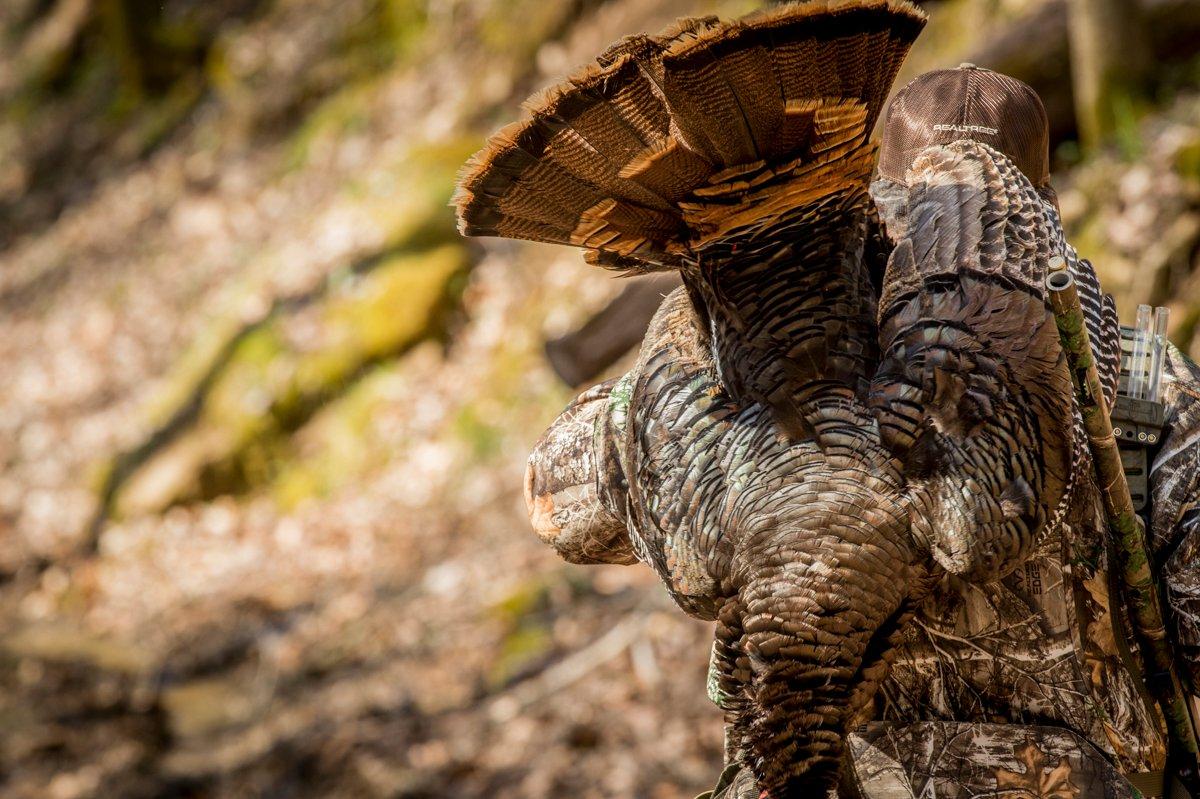Stay safe and go solo after unpressured birds this season
Social distancing? Yep, this season is different. While it's true I've happily gotten together with my tight-knit group of longtime gobbler chasers on hunts around the country for decades, certain local buds have also called me the lone wolf over the years. I'm okay with that, as I like to turkey hunt alone, too.
It used to be many of us did that simply to get on birds we knew about and wanted to keep a secret. It's still that way, of course. This spring season's COVID-19 pandemic has affirmed such anti-social tendencies. It's now okay to hunt alone.
Hunter Pressure
Based on official reports from state wildlife agencies this season - as well as those from my wide circle of turkey buds around the country, but particularly east of the Mississippi - a lot of folks are out there chasing gobblers. In the West, hunter pressure is less, as public lands in some cases are far bigger.
Nonresident hunter options have been curtailed in certain states, with permit sales ceasing. And that's a good thing for the resident turkey hunter who wants to go it alone. But … the coronavirus has not only sheltered us in place but also given more people free time to hunt. Working folks once hard-pressed for time, those who could only go out on weekends, can now do it any day of the week.
This season, I've heard such frustrated statements as, I've never seen so many guys in the turkey woods, or the public-land parking area looked like a used truck lot.
If ever there was a time to avoid those roadside spots from where everyone has seen highly visible field strutters shadowing hens, it's now. The key to this challenge is to plan to go where no one else is.
Hatch Your Plan(s)
Failing to plan is planning to fail, the old saying goes.
With hunter pressure in mind, your priority for hunting alone this season is to lock down a spot where no one else will hunt. Then create a series of options, a game plan if you will, for where you'll hunt, including where you'll go when you find other hunters where you'd thought it would be a solo deal. Some options:
Stay Close, Behind Posters, with Permission: Find a landowner, maybe a friend or acquaintance or even someone you haven't introduced yourself to yet, who has birds on their property. Rather than knock on their door the way we used to do it, call them up. Explain who you are, what you want to do, and ask if they'll grant permission. Be sure to nail down specific limitations, as to where to park, property lines, how to contend with rambling livestock, and if they'll be working in the fields that day.
And here's the kicker: I sometimes like to roll the dice and ask permission on new land that's already posted.
Some of my best turkey hunting spots are a long walk away from places accessed near the road. Untouched woods behind trash, litter, landfill and the like. Rusted trucks on cinder blocks, abandoned and tilting shacks that hide big timber. Nobody hunts behind these rundown places.
The person might grant you one-day access, or you could offer to pay a trespass fee equal to a short-term lease. This helps you cobble together places to hunt where you'll have the land to yourself. And always be sure to double-check to see if you're the only person doing this. I've hit new ground a time or two only to find other people hunting it. All the time I thought it was mine alone that day. Not the case.
Go Deep, Away from Access Points: Another option is to find those roadside spots from where everyone has seen field strutters, then, assuming you have access, hatch a plan to hunt the distance woods and fields. It's so often the case guys will hit a spot where they've rubber-necked and glassed birds. But you'll sometimes find more turkeys by walking past that spot into others with less pressure.
Hunt Ugly Spots: Seriously, some of my best turkey hunting spots are a long walk away from places accessed near the road. Untouched woods behind trash, litter, landfill and the like. Rusted trucks on cinder blocks, abandoned and tilting shacks that hide big timber. Nobody hunts behind these rundown places.
Why? You often can't see turkeys from the road.
What you can see (on a map), are roosting areas, hidden fields, two-tracks, river bottoms, benches, ridges and so on. The key to hunting alone is to prospect for these spots. As always, get landowner permission, both for access (where you park the truck), and for where you're going.
Offer to Post Land: Say what? I have one good friend, a serious turkey hunter, who knew an older woman from his church. She had a problem: guys were hunting her land without permission, shooting turkeys and putting a little fear in her heart. Could my buddy help? she asked. He could. He posted her land, with one little caveat: Could he turkey hunt it?
He has for decades, and quite successfully mind you, while also keeping interlopers off her land. It is what it is.
Some Basics
Carry your cellphone, even if you put it on airplane mode to avoid interruption and concentrate on your hunt. That's important for safety, mapping, weather trends, all that.
If you're hunting big timber, pack in your day's supplies - snacks, water, etc. - enough to hunt comfortably alone. Tote a compass (a forgotten art for some) or use phone apps to find your way.
If you don't have one, buy a good turkey vest. One sturdy enough to pack out a 20-pound gobbler. To hunt far from the road, you need to be comfortable.
[What You Need in Your Turkey Vest]
Tell Someone
Though I'm almost positive my wife will forget where I'm hunting that day, I try to do my best to tell her where. I draw a little map with a See you later note. I sketch my plan for the day, as well as backup options. I list phone numbers, and access points, if needed. Sometimes I'll even email or text her a map.
Well, you get the idea.
After all these years, she has a pretty good hunch of where I hunt locally and regionally. Then again, given this unusual season, she will and has been hearing about new spots I've scouted. It's a learning process for everybody. The upside is I'm finding new ground to hunt.
And if you still want to hunt with a buddy, but do it separately, drive your own vehicles to the spot. Practice social distancing and all that, but hunt alone. Meet up again later in the day. And share your day's story ...
But Hush Up, Too
On the other hand, I'll do my best to not tell anyone else where I'm going. This includes some turkey hunting friends and acquaintances. Not that day. Not that night. Not after I kill a bird. It's the best way to ensure you continue to hunt alone.
I learned this the hard way. Over the years I've told a friend or casual acquaintance in confidence where I'd found birds, and where I'd be hunting on opening day, or that week, or whatever. And in several cases, I've found them hunting there. Live and learn. You've no doubt got a story or two like this.
Other tried-and-true turkey hunters I know accept the fact that they won't be telling you where they've found birds and that I sure won't either. I like that. Selfish to some? Maybe. When pressed for where I killed a bird, I'll name the county, not the town, not the road; that's just the way it is.
Social Distancing
Hunting alone is also sometimes safer than on a hard-hit public land. And these days, maybe a wise idea for other reasons.
We all know the current drill by now: Stay six feet apart. Wear a mask around others. Gloves. All that. Whether you feel this is too much advice or maybe not enough, the fact is, this turkey season of the pandemic is unprecedented. And while many of us are just trying to find a spot to hunt ourselves, in truth, we are all in this together.
As for me, I'll likely be off in some timber stand, trying to locate turkeys a mile or two from the road. Alone.








